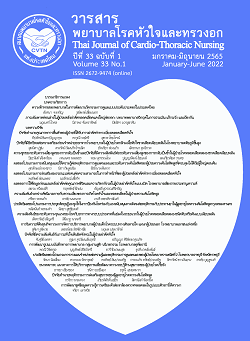ปัจจัยทำนายคุณภาพชีวิตของผู้ป่วยสูงอายุโรคมะเร็งระยะลุกลาม ที่ได้รับการดูแลแบบประคับประคอง
คำสำคัญ:
คุณภาพชีวิต, ผู้ป่วยสูงอายุโรคมะเร็งระยะลุกลาม, ความสามารถทางด้านร่างกาย, ความพึงพอใจต่อการได้รับข้อมูล, การรับรู้ภาระค่าใช้จ่ายบทคัดย่อ
การวิจัยครั้งนี้เป็นการหาความสัมพันธ์เชิงทำนายเพื่อศึกษาอิทธิพลของความสามารถทางด้านร่างกาย ความพึงพอใจต่อการได้รับข้อมูลและการรับรู้ภาระค่าใช้จ่าย ต่อคุณภาพชีวิตของผู้สูงอายุโรคมะเร็งระยะลุกลามที่ได้รับการดูแลแบบประคับประคอง กลุ่มตัวอย่างเป็นผู้สูงอายุโรคมะเร็งระยะลุกลามจำนวน 85 ราย เก็บข้อมูลโดยใช้แบบสอบถามข้อมูลส่วนบุคคล แบบสอบถามคุณภาพชีวิต ความสามารถทางด้านร่างกาย ความพึงพอใจต่อการได้รับข้อมูลและการรับรู้ภาระค่าใช้จ่าย วิเคราะห์อำนาจการทำนายโดยใช้สถิติถดถอยพหุคูณ
ผลการศึกษาพบว่า กลุ่มตัวอย่างส่วนใหญ่ร้อยละ 32.9 เป็นโรคมะเร็งปอด คุณภาพชีวิตโดยรวมระดับปานกลาง (Mean = 62.05, SD = 21.38) ความสามารถทางด้านร่างกาย (KPS score 70-80) ร้อยละ 52.9 ความพึงพอใจต่อการได้รับข้อมูล (Mean = 70.59, SD = 21.46) และการรับรู้ภาระค่าใช้จ่ายเป็นภาระน้อย (Mean = 25.94, SD = 31.19) ปัจจัยของความสามารถทางด้านร่างกาย ความพึงพอใจต่อการได้รับข้อมูล และการรับรู้ภาระค่าใช้จ่าย สามารถร่วมอธิบายความแปรปรวนของคุณภาพชีวิตของผู้ป่วยสูงอายุโรคมะเร็งระยะลุกลามที่ได้รับการดูแลแบบประคับประคองได้ร้อยละ 53 (adjusted R² = 0.51, R² = 0.53, F = 30.05, p < 0.001) ปัจจัยที่ สามารถทำนายคุณภาพชีวิตอย่างมีนัยสำคัญทางสถิติคือ ความสามารถทางด้านร่างกาย (β = 0.55, p < 0.01) กับการรับรู้ภาระค่าใช่จ่าย (β = - 0.27, p < 0.01)
ผลการศึกษาเสนอแนะว่า พยาบาลควรพัฒนากิจกรรมการดูแลที่ส่งเสริมการคงไว้ซึ่งความสามารถทางด้านร่างกาย ประเมินการรับรู้ภาระค่าใช้จ่าย และหาแนวทางในการสนับสนุน จัดหาแหล่งประโยชน์ให้ ซึ่งจะส่งเสริมการเปลี่ยนผ่านของผู้ป่วยสูงอายุโรคมะเร็งระยะลุกลามที่ได้รับการดูแลแบบประคับประคองอย่างมีประสิทธิภาพและส่งผลให้มีคุณภาพชีวิตดีขึ้น
เอกสารอ้างอิง
World Health Organization. Cancer [Internet]. 2017 [cited 2017 Jul 10]. Available from: https://www. who. int /health-topics/cancer#tab=tab_1
National Cancer Institute. Hospital based cancer registry 2017. Bangkok: Pornsup Printing; 2019. (in Thai)
White MC, Holman DM, Boehm JE, Peipins LA, Grossman M, Henley SJ. Age and cancer risk: a potentially modifiable relationship. Am J Prev Med. 2014;46(301):S7-15.
Park SA, Chung SH, Lee Y. Factors influencing the quality of life of patients with advanced cancer. Asian Nurs Res. 2017;33:108-12.
Trakoolngamden B, Wongteerasup S. Predicting factors of quality of life among patients with terminal cancer at out–patient department of hospitals in medical service department, bangkok metropolitan and faculty of medi-cine vajira hospital, Navamindradhiraj University. Kuakarun Journal of Nursing. 2018;23(2):199-216. (in Thai)
Teerathongdee K, Ronnarithivichai C, Thongchareon V, Pongthavornkamol K. Factors predicting quality of life in aged patients with colorectal cancer after stomal surgery. Thai Cancer Journal. 2014;34(2):68-78. (in Thai)
Husson O, Oerlemans S, Mols F, Smeets RE, Poortmans PM, van de Poll-Franse LV. Satisfaction with in-formation provision is associated with baseline but not with follow-up quality of life among lymphoma patients: Results from the PROFILES registry. Acta Oncol. 2014;53(7):917-26.
Nicolaisen M, Muller S, Patel HR, Hanssen TA. Quality of life and satisfaction with information after radical pros-tatectomy, radical external beam radiotherapy and postoperative radiotherapy: a long-term follow-up study. J Clin Nurs. 2014;23(23-24):3403-14.
Pongthavornkamol K, Lekdamrongkul P, Wanawarodom P, Ratchawong W. Relationships between social support, financial status, health-promoting behaviors, and quality of life among women with breast cancer un-dergoing radiation treatment. Nursing Science Journal of Thailand. 2014;32(1):15-27. (in Thai)
Delgado-Guay M, Ferrer J, Rieber AG, Rhondali W, Tayjasanant S, Ochoa J, et al. Financial distress and its associations with physical and emotional symptoms and quality of life among advanced cancer patients. The Oncologist. 2015;20(9):1092-8.
Kale HP, Carroll NV. Self-reported financial burden of cancer care and its effect on physical and mental health-related quality of life among US cancer survivors. Cancer. 2016;122(8):283-9.
Bostock S, Steptoe A. Association between low functional health literacy and mortality in older adults: longitu-dinal cohort study. BMJ. 2012; 344:e1602 doi:10.1136/bmj. e1602
Meleis A. Transitions Theory Middle-Range and Situation-Specific Theories in nursing research and practice. 1st Edition. New York: Springer Publishing Company; 2010.
Griffiths J, Putthinoi S, Pongsaksri M. The general practitioner assessment of cognition; GPCOG (Thai Ver-sion): validity and reliability. Chiang Mai: Department of Occupational Therapy, Faculty of Associated Medical Sciences, Chiang Mai University; 2013.
Tiansaard J, Chaiviboontham S, Phinitkhajorndech N. Perception of symptom burden, financial burden, and quality of life in patients with end stage renal disease undergoing hemodialysis. Ramathibodi Nursing Journal. 2017;23(1):60-77. (in Thai)
Brodaty H, Pond D, Kemp NM, Luscombe G, Harding L, Berman K, et al. The GPCOG: a new screening test for dementia designed for general practice. J Am Geriatr Soc. 50(3): 530-34.
Fayers P, Bottomley A. Quality of life research within the EORTC-the EORTC QLQ-C30. European organisa-tion for research and treatment of cancer. Eur J Cancer. 2002;38 Suppl 4: S125-33.
Silpakit C, Sirilerttrakul S, Jirajarus M, Sirisinha T, Sirachainan E, Ratanatharathorn V. The European Organiza-tion for Research and Treatment of Cancer Quality of Life Questionnaire (EORTC QLQ-C30): Validation study of the Thai version. Qual Life Res. 2006;15(1):167-72.
Arraras JI, Greimel E, Sezer O, Chie WC, Bergenmar M, Costantini A, et al. An international validation study of the EORTC QLQ-INFO25 questionnaire: an instrument to assess the information given to cancer patients. Eur J Cancer. 2010;46(15):2726-38.
Mor V, Laliberte L, Morris JN, Wiemann M. The Karnowski Performance Status Scale. An examination of its reliability and validity in a research setting. Cancer.1984;53 (9):2002-7.
Junsomkoy C, Wirojratana V, Chanruangvanich W. Relationships between basic conditioning factors, symptom severity, palliative self-care behaviors and quality of life in older adults with advanced cancer receiving chemo-therapy. Journal of The Royal Thai Army Nurses. 2018;19:108-17. (in Thai)
Chen Y, Xiao Y, Yang Y, et al. Decomposing contribution of age and non-age factors to rapid growth of lung cancer in Xuanwei over past 30 years. BMC Public Health. 2015;15:1116-1116.
Leppert W, Majkowicz M, Forycka M, Mess E, Zdun-Ryzewska A. Quality of life assessment in advanced cancer patients treated at home, an inpatient unit, and a day care center. Onco Targets Ther. 2014;8(7):687-95.
Shallwani SM, Simmonds MJ, Kasymjanova G, Spahija J. Quality of life, symptom status and physical performance in patients with advanced non-small cell lung cancer undergoing chemotherapy: an exploratory analysis of secondary data. Lung cancer. 2016; 99:69-75.
ดาวน์โหลด
เผยแพร่แล้ว
รูปแบบการอ้างอิง
ฉบับ
ประเภทบทความ
สัญญาอนุญาต
ลิขสิทธิ์ (c) 2022 วารสารพยาบาลโรคหัวใจและทรวงอก

อนุญาตภายใต้เงื่อนไข Creative Commons Attribution-NonCommercial-NoDerivatives 4.0 International License.
บทความนี้ยังไม่เคยตีพิมพ์หรืออยู่ในระหว่างส่งไปตีพิมพ์ในวารสารอื่น ๆ มาก่อน และกองบรรณาธิการขอสงวนสิทธิ์ในการตรวจทาน และแก้ไขต้นฉบับตามเกณฑ์ของวารสาร ในกรณีที่เรื่องของท่านได้ได้รับการตีพิมพ์ในวารสารฉบับนี้ถือว่าเป็น ลิขสิทธิ์ของวารสารพยาบาลโรคหัวใจและทรวงอก






